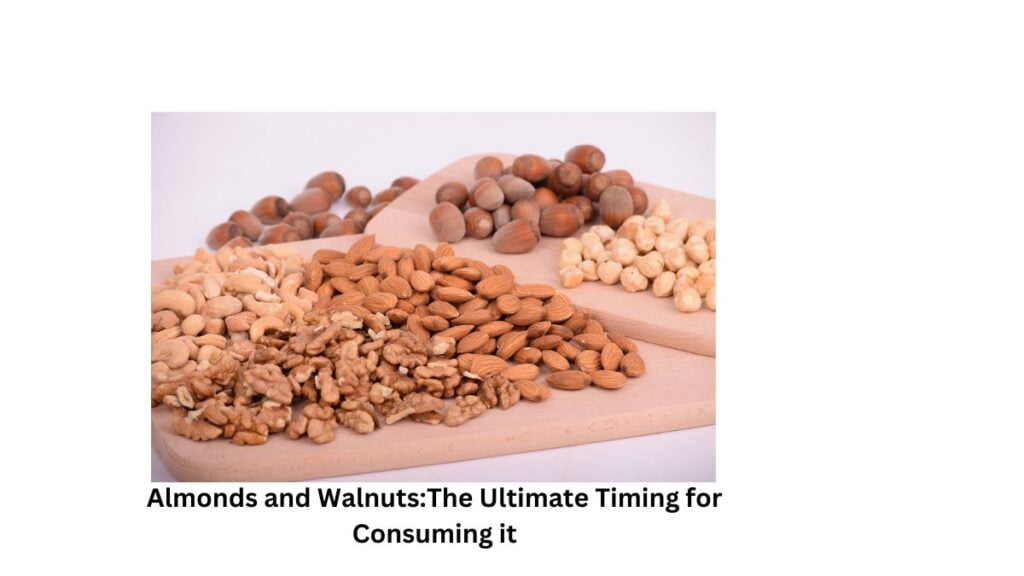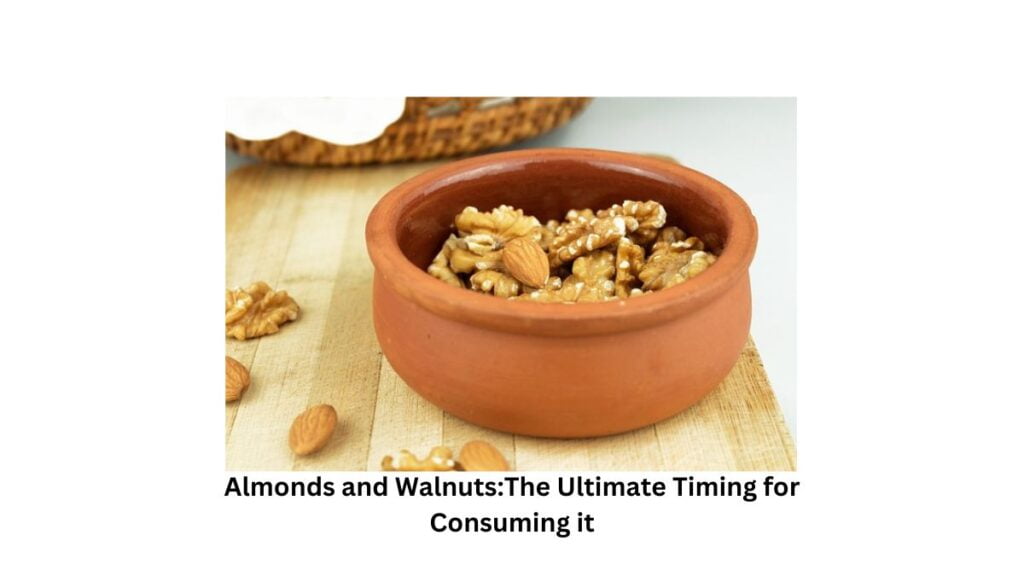Introduction:
Nutrition Experts’ Guide: The Ultimate Timing for Consuming Almonds and Walnuts
by vinay1

In the pursuit of optimal health, dietary choices play a pivotal role. Among the plethora of options, almonds and walnuts stand out as nutritional powerhouses, offering a host of benefits. But when is the best time to harness their full potential? We delve into expert insights to uncover the ideal timing for consuming almonds and walnuts to reap maximum benefits.
What is the best time to eat almonds and walnuts? What happens if consumed daily?
The best time to eat almonds and walnuts can vary depending on individual preferences, dietary habits, and nutritional goals. However, here are some general guidelines regarding the timing of consumption:

- Morning: Consuming almonds and walnuts in the morning can provide a nutritious start to your day. They can be included in breakfast options such as oatmeal, yogurt, or smoothies to kickstart your metabolism and provide sustained energy throughout the morning.
- Snack Time: Almonds and walnuts make excellent snacks between meals. Their combination of protein, healthy fats, and fiber can help keep you feeling full and satisfied, making them a great choice for combating midday hunger cravings.
- Pre-Workout: Eating almonds and walnuts before a workout can supply your body with sustained energy to fuel your exercise session. The protein and healthy fats in these nuts can support muscle function and provide a source of long-lasting energy.
- Post-Workout: Consuming almonds and walnuts after a workout can aid in muscle recovery and replenish glycogen stores. Pairing them with a source of carbohydrates, such as fruit or whole grains, can enhance post-exercise recovery and promote muscle repair.
- Evening Snack: Enjoying almonds and walnuts as an evening snack can provide a satisfying and nutritious way to curb nighttime cravings. Their nutrient-rich profile can help keep you feeling satisfied without overindulging in unhealthy snacks before bedtime.
As for consuming almonds and walnuts daily, incorporating them into your diet on a regular basis can offer numerous health benefits:
- Heart Health: Almonds and walnuts are rich in monounsaturated and polyunsaturated fats, which are beneficial for heart health. Regular consumption has been associated with lower levels of LDL (bad) cholesterol and reduced risk of heart disease.
- Brain Health: The omega-3 fatty acids found in walnuts are essential for brain health and cognitive function. Eating walnuts regularly may help improve memory and cognitive performance.
- Weight Management: Despite being calorie-dense, almonds and walnuts can aid in weight management when consumed in moderation. Their combination of protein, fiber, and healthy fats helps promote feelings of fullness and satiety, which can prevent overeating and support weight loss efforts.
- Blood Sugar Control: Almonds and walnuts have a low glycemic index and can help stabilize blood sugar levels, making them suitable choices for individuals with diabetes or those looking to manage their blood sugar levels.
- Nutrient Intake: Almonds and walnuts are packed with essential nutrients such as vitamin E, magnesium, and antioxidants, which play crucial roles in maintaining overall health and well-being.
However, it’s essential to consume almonds and walnuts in moderation as part of a balanced diet. While they offer numerous health benefits, excessive consumption can lead to weight gain due to their high calorie content. Additionally, individuals with nut allergies should avoid almonds and walnuts altogether.
Should we soak almonds and walnuts before eating?
Soaking almonds and walnuts before eating is a practice followed by some individuals for various reasons, but it is not necessary for everyone. Here are some factors to consider when deciding whether to soak these nuts:

- Digestibility: Some people believe that soaking nuts can make them easier to digest by reducing the enzyme inhibitors and phytic acid content, which can inhibit nutrient absorption. Soaking can also help soften the nuts, making them gentler on the digestive system.
- Nutrient Absorption: Soaking nuts may enhance the absorption of certain nutrients, such as magnesium and zinc, by reducing the phytic acid content. This can potentially increase the bioavailability of these nutrients in your body.
- Texture and Taste: Soaking almonds and walnuts can alter their texture and taste. Soaked nuts tend to have a softer texture and may taste slightly different compared to raw nuts. Some people prefer the texture and flavor of soaked nuts, while others prefer them raw.
- Personal Preference: Whether or not to soak almonds and walnuts ultimately depends on personal preference and digestive tolerance. Some individuals may find that soaking nuts improves their digestion and overall well-being, while others may not notice any difference or may prefer the taste and texture of raw nuts.
- Time Considerations: Soaking nuts requires advance planning, as they need to be soaked in water for several hours or overnight before consuming. If you prefer the convenience of eating nuts without soaking, then raw nuts may be the better option for you.
Are almonds and walnuts a good source of protein? In what quantity should we eat it daily?
Almonds and walnuts are indeed sources of protein, although they are not as protein-dense as animal-based foods or certain legumes. Here’s a breakdown of the protein content in almonds and walnuts:

- Almonds: Almonds contain about 6 grams of protein per ounce (28 grams). While almonds are not considered a high-protein food compared to sources like meat or dairy, they still contribute to your daily protein intake.
- Walnuts: Walnuts contain approximately 4 grams of protein per ounce (28 grams). Like almonds, walnuts provide protein but are not as concentrated a source as animal-based proteins or some plant-based options like beans or lentils.
In terms of daily consumption, there is no specific quantity of almonds and walnuts that everyone should eat daily, as individual nutritional needs vary based on factors such as age, gender, activity level, and overall diet. However, including a moderate portion of almonds and walnuts in your daily diet can offer numerous health benefits without causing overconsumption of calories.
A serving size of almonds or walnuts is typically around 1 ounce (about 28 grams), which is roughly a small handful. Consuming this amount daily, either as a snack or added to meals, can provide you with the nutritional benefits of these nuts without significantly impacting your calorie intake.
It’s important to remember that while almonds and walnuts are nutritious, they are also calorie-dense. Eating them in excess can lead to weight gain if not accounted for within your overall caloric intake. Therefore, moderation is key when incorporating almonds and walnuts into your diet, especially if you’re watching your calorie intake or trying to manage your weight.
Conclusion:
Incorporating almonds and walnuts into your daily diet at strategic intervals can unlock their full potential in promoting overall health and well-being. By aligning your consumption with expert recommendations, you can harness the maximum benefits of these nutrient-rich nuts throughout the day. Whether it’s kickstarting your morning or aiding post-workout recovery, almonds and walnuts stand as versatile additions to a balanced diet, contributing to your journey towards optimal health.





